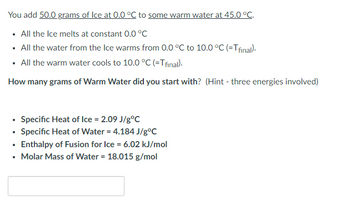
Chemistry
10th Edition
ISBN: 9781305957404
Author: Steven S. Zumdahl, Susan A. Zumdahl, Donald J. DeCoste
Publisher: Cengage Learning
expand_more
expand_more
format_list_bulleted
Concept explainers
Question
Please help as soon as possible and I will leave a like.

Transcribed Image Text:You add 50.0 grams of Ice at 0.0 °C to some warm water at 45.0 °C.
All the Ice melts at constant 0.0 °C
• All the water from the Ice warms from 0.0 °C to 10.0 °C (=Tfinal).
• All the warm water cools to 10.0 °C (=Tfinal).
How many grams of Warm Water did you start with? (Hint - three energies involved)
• Specific Heat of Ice = 2.09 J/gºC
• Specific Heat of Water = 4.184 J/gºC
• Enthalpy of Fusion for Ice = 6.02 kJ/mol
• Molar Mass of Water = 18.015 g/mol
.
Expert Solution
This question has been solved!
Explore an expertly crafted, step-by-step solution for a thorough understanding of key concepts.
Step by stepSolved in 5 steps

Knowledge Booster
Learn more about
Need a deep-dive on the concept behind this application? Look no further. Learn more about this topic, chemistry and related others by exploring similar questions and additional content below.Similar questions
- Show the Mechanism and prouduct SH T- 2- Na H ph ph ठिarrow_forwardChemistry Thanksarrow_forwardall 43% LTE 2:34 Question 4 of 8 Submit Construct the expression for Ka for the weak acid, NH,*. NH,*(aq) + H,0(10) = H,0*(aq) + NH;(aq) 1 Based on the definition of Ka, drag the tiles to construct the expression for the given acid. Ka %3D 5 RESET [H,O] [H,O*] [OH-] [NH,] [NH,] [NH,] 2[H,0O] 2[H,0*] 2[OH-] 2[NH,] 2[NH,] 2[NH,] [H,0]? [H,0*12 [OH-]? [NH,*)? [NH,]? [NH,-]? IIarrow_forward
- The conjugate base of propan-1-ol, CH3CH2OH, is shown below... :0: H3CC-CH3 H TRUE, FALSE OR IT DEPENDS. For the toolbar, press ALT+F10 (PC) or ALT+EN+510/Madarrow_forwardCalculate the percent ionization of a 2.6\times 10-2 mol-L-1 solution of the weak base ephedrine (C10H 15ON, Kb 4.5\times 10-5). Plase answer fast i give you upvote.arrow_forwardPlease don't provide hand writtin solution...arrow_forward
- 17. Mechanism aq NaOH H3O+ HO, 18. Mechanism cat. TSOH HO, MEOH, refluxarrow_forwardSynthesis also label any major/minor/trace productsarrow_forwardGive typed full explanation not a single word hand written otherwise leave it Calculate the pOH of a 9.5 x 10-2mol L-1solution of ascorbic acid (Ka1 = 7.9 x 105, Ka2= 2.5 x 10-12). Show your work evaluating the validity of an appropriate simplifying assumption.arrow_forward
arrow_back_ios
arrow_forward_ios
Recommended textbooks for you
 ChemistryChemistryISBN:9781305957404Author:Steven S. Zumdahl, Susan A. Zumdahl, Donald J. DeCostePublisher:Cengage Learning
ChemistryChemistryISBN:9781305957404Author:Steven S. Zumdahl, Susan A. Zumdahl, Donald J. DeCostePublisher:Cengage Learning ChemistryChemistryISBN:9781259911156Author:Raymond Chang Dr., Jason Overby ProfessorPublisher:McGraw-Hill Education
ChemistryChemistryISBN:9781259911156Author:Raymond Chang Dr., Jason Overby ProfessorPublisher:McGraw-Hill Education Principles of Instrumental AnalysisChemistryISBN:9781305577213Author:Douglas A. Skoog, F. James Holler, Stanley R. CrouchPublisher:Cengage Learning
Principles of Instrumental AnalysisChemistryISBN:9781305577213Author:Douglas A. Skoog, F. James Holler, Stanley R. CrouchPublisher:Cengage Learning Organic ChemistryChemistryISBN:9780078021558Author:Janice Gorzynski Smith Dr.Publisher:McGraw-Hill Education
Organic ChemistryChemistryISBN:9780078021558Author:Janice Gorzynski Smith Dr.Publisher:McGraw-Hill Education Chemistry: Principles and ReactionsChemistryISBN:9781305079373Author:William L. Masterton, Cecile N. HurleyPublisher:Cengage Learning
Chemistry: Principles and ReactionsChemistryISBN:9781305079373Author:William L. Masterton, Cecile N. HurleyPublisher:Cengage Learning Elementary Principles of Chemical Processes, Bind...ChemistryISBN:9781118431221Author:Richard M. Felder, Ronald W. Rousseau, Lisa G. BullardPublisher:WILEY
Elementary Principles of Chemical Processes, Bind...ChemistryISBN:9781118431221Author:Richard M. Felder, Ronald W. Rousseau, Lisa G. BullardPublisher:WILEY

Chemistry
Chemistry
ISBN:9781305957404
Author:Steven S. Zumdahl, Susan A. Zumdahl, Donald J. DeCoste
Publisher:Cengage Learning

Chemistry
Chemistry
ISBN:9781259911156
Author:Raymond Chang Dr., Jason Overby Professor
Publisher:McGraw-Hill Education

Principles of Instrumental Analysis
Chemistry
ISBN:9781305577213
Author:Douglas A. Skoog, F. James Holler, Stanley R. Crouch
Publisher:Cengage Learning

Organic Chemistry
Chemistry
ISBN:9780078021558
Author:Janice Gorzynski Smith Dr.
Publisher:McGraw-Hill Education

Chemistry: Principles and Reactions
Chemistry
ISBN:9781305079373
Author:William L. Masterton, Cecile N. Hurley
Publisher:Cengage Learning

Elementary Principles of Chemical Processes, Bind...
Chemistry
ISBN:9781118431221
Author:Richard M. Felder, Ronald W. Rousseau, Lisa G. Bullard
Publisher:WILEY